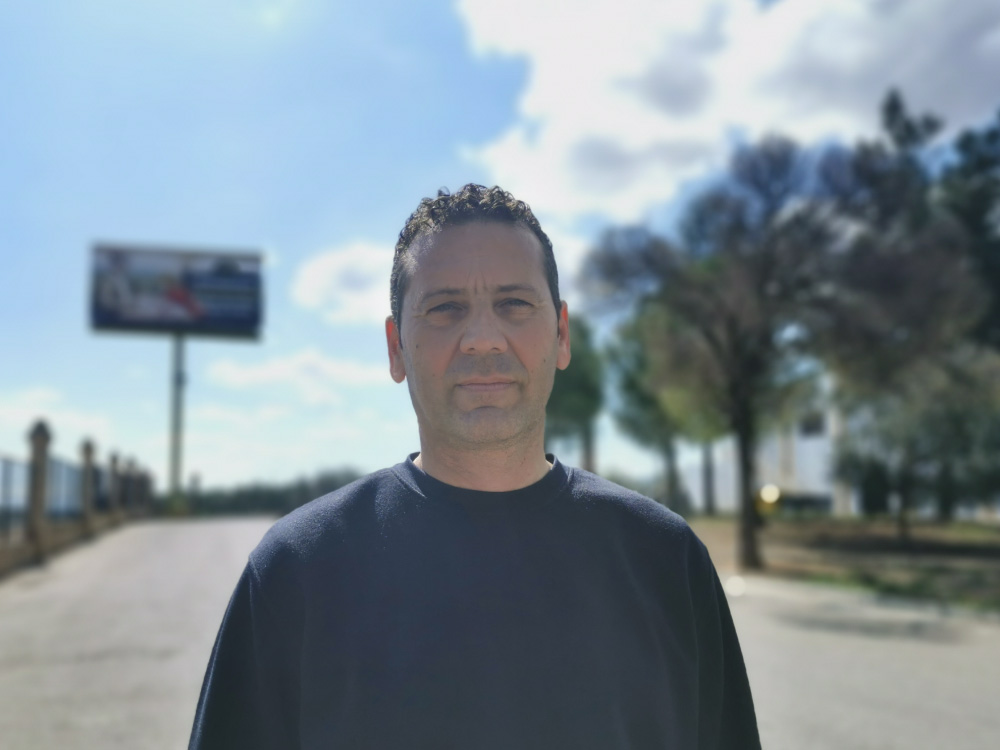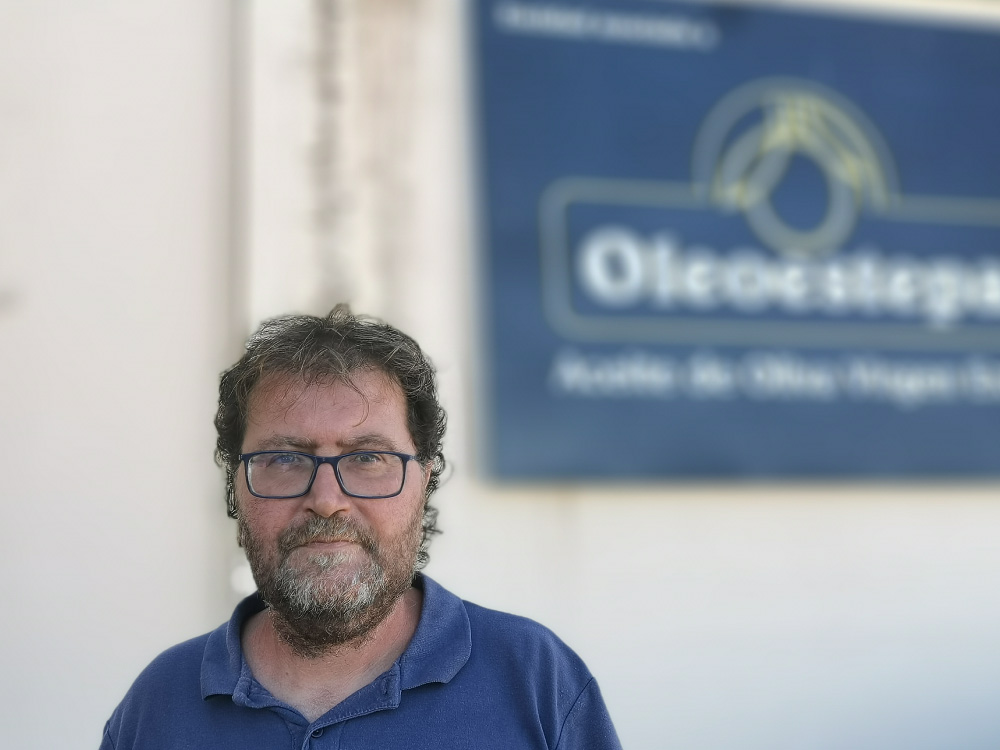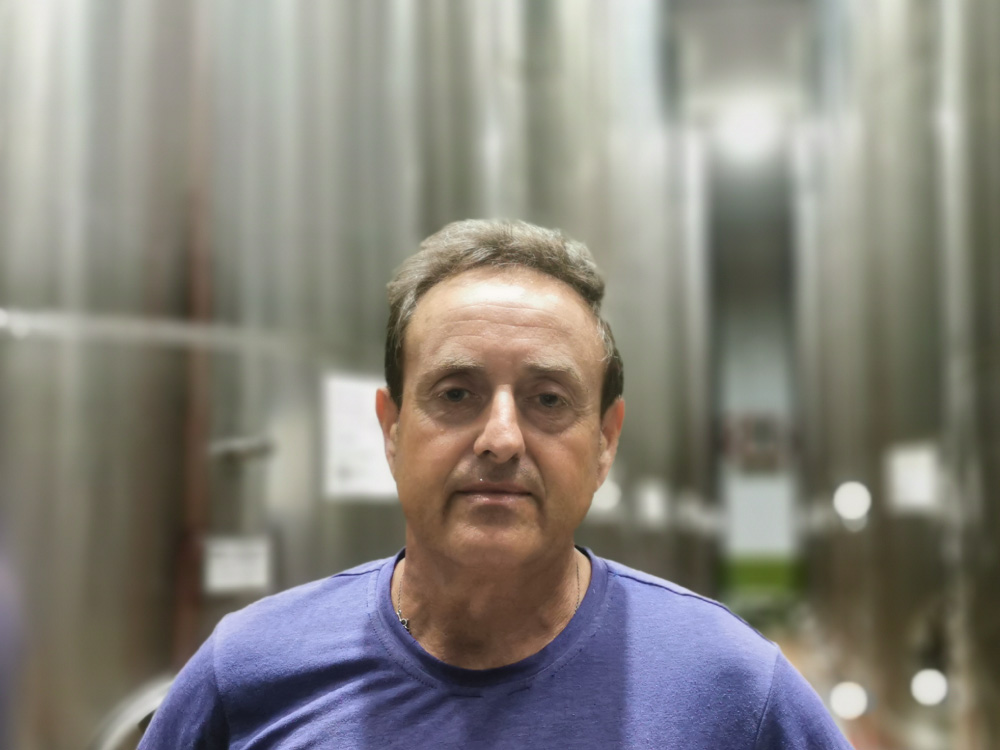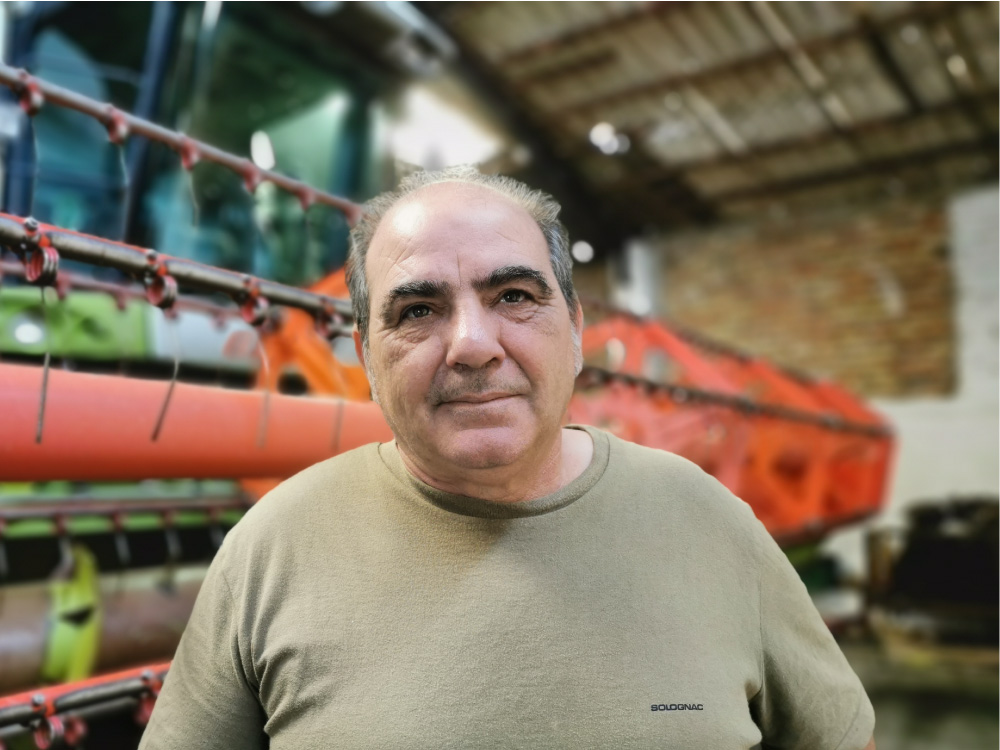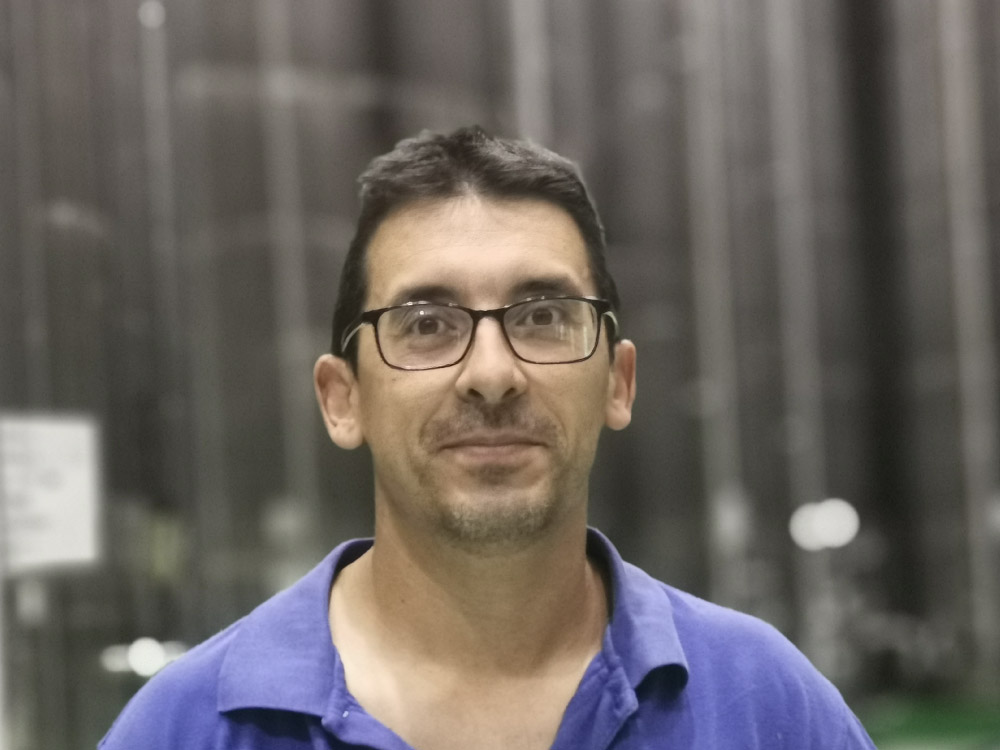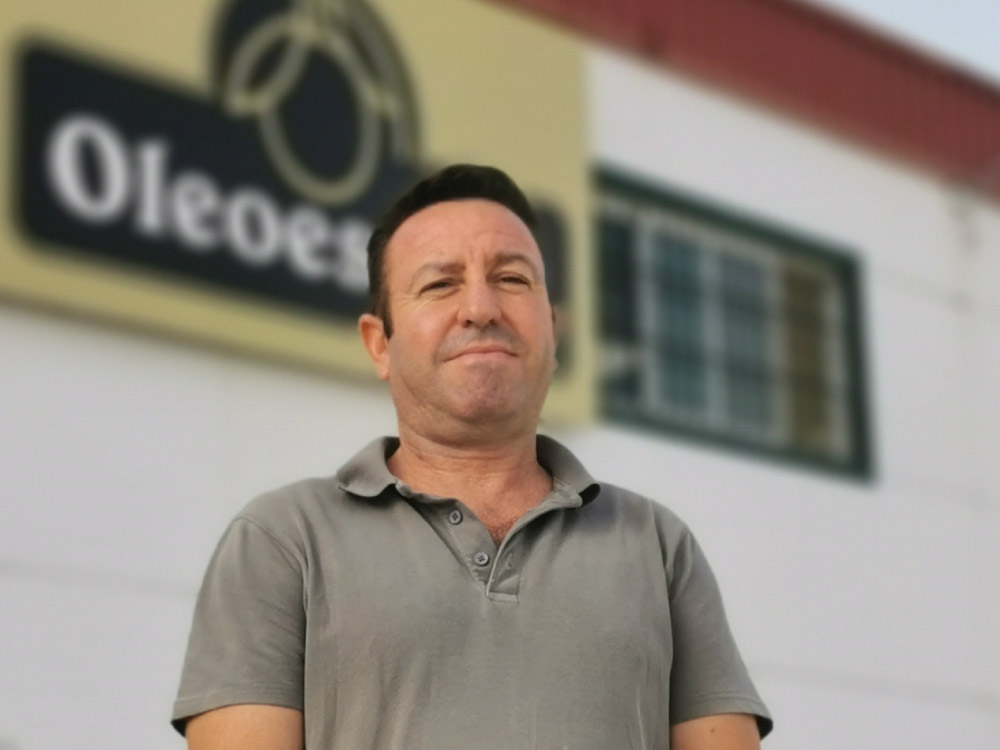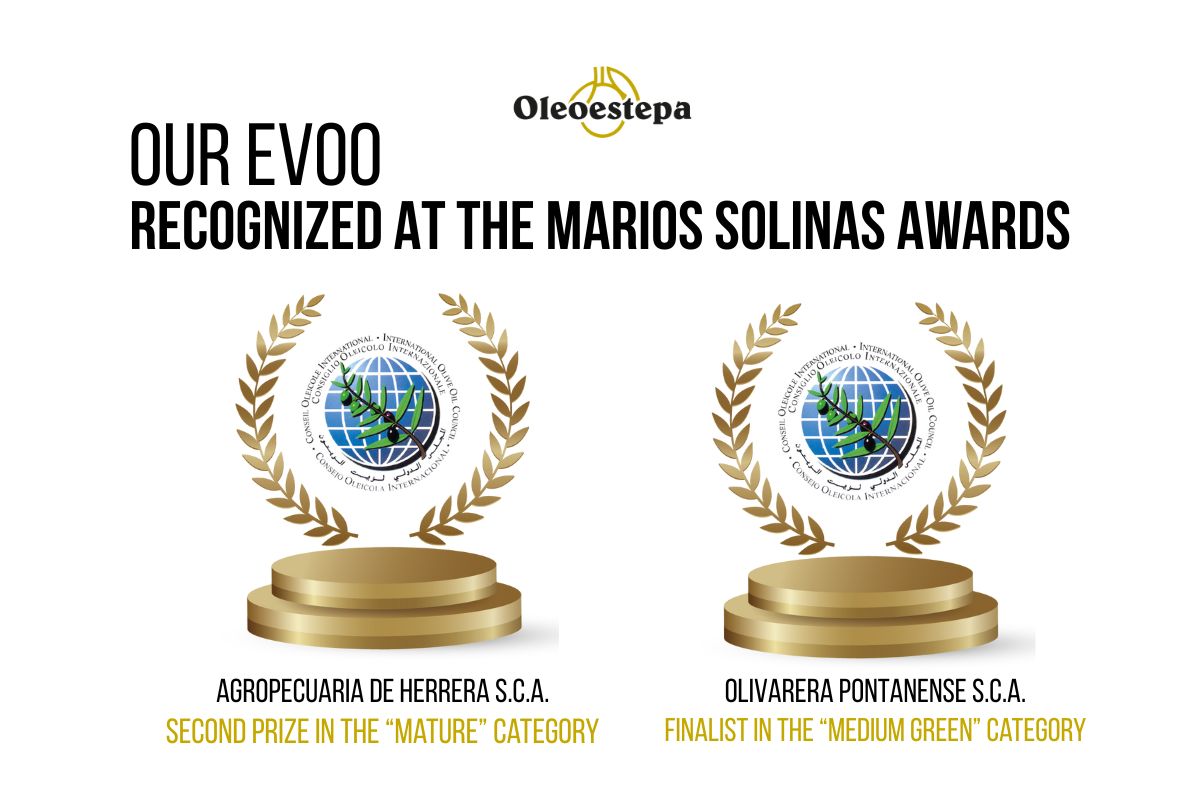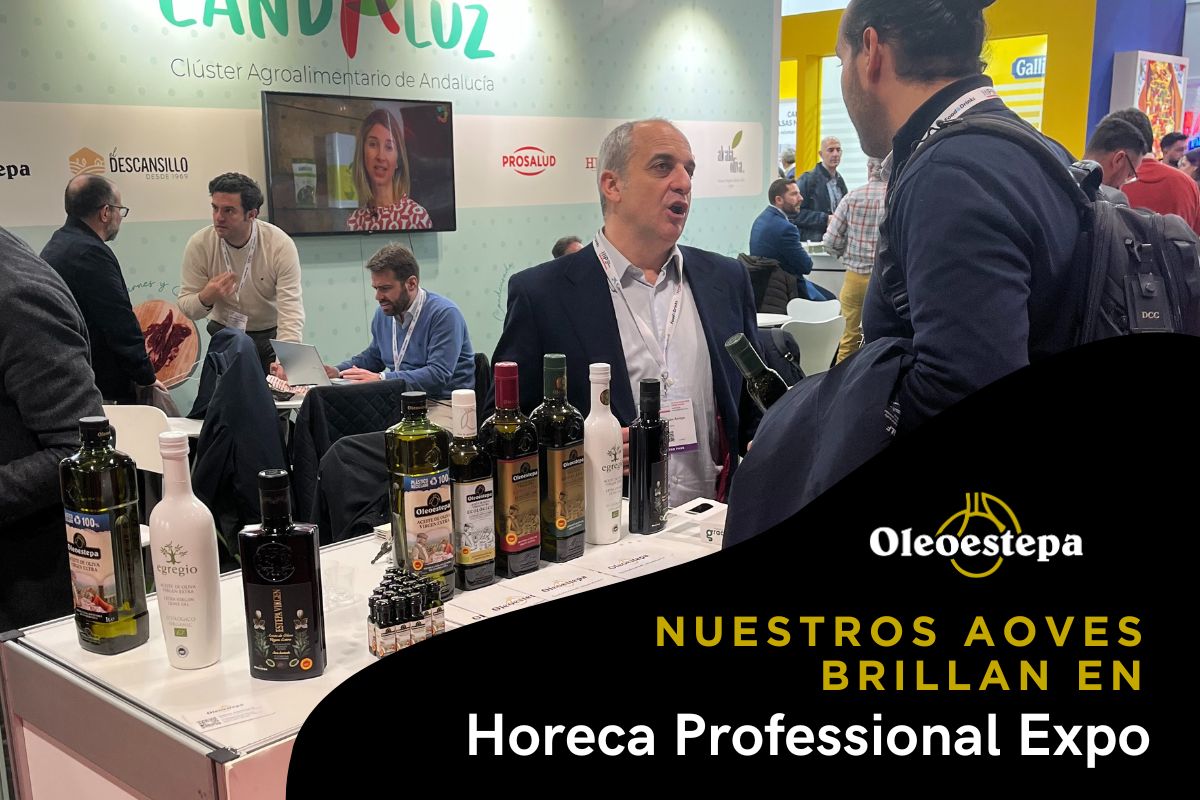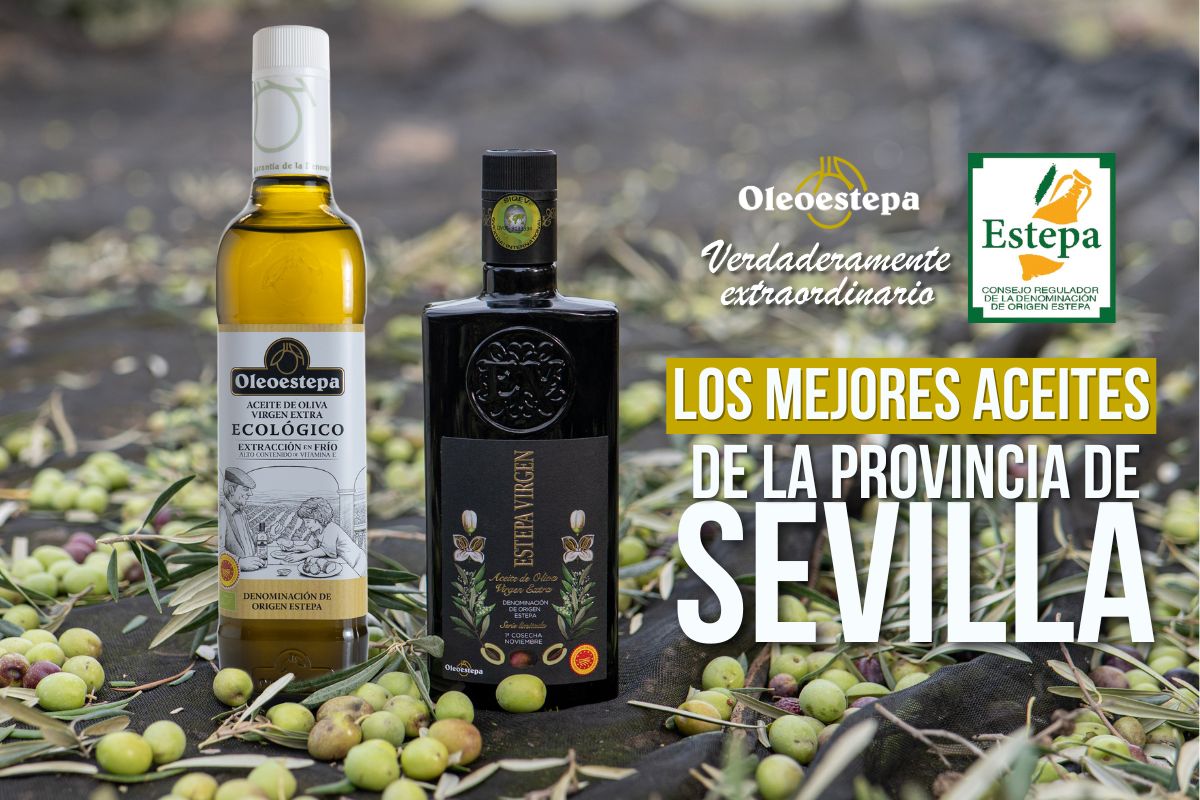In order to obtain a high quality extra virgin olive oil, the coordinated participation of a large number of professionals is essential. Giving the best of each one at each stage is the only way to achieve excellence. From the farmer who cares for and pampers his olive trees to the person in charge of the industrial plant where the olive juice is packaged so that it reaches homes, there are several key phases in this process. Among them is the figure of the oil master miller, who is primarily responsible for optimally extracting the olive juice, transferring the quality of a healthy fruit to its juice, to the extra virgin olive oil.
With this space we want to pay tribute to this key figure in the associated oil mills and continue learning about olive culture and the secrets behind a high quality extra virgin olive oil.
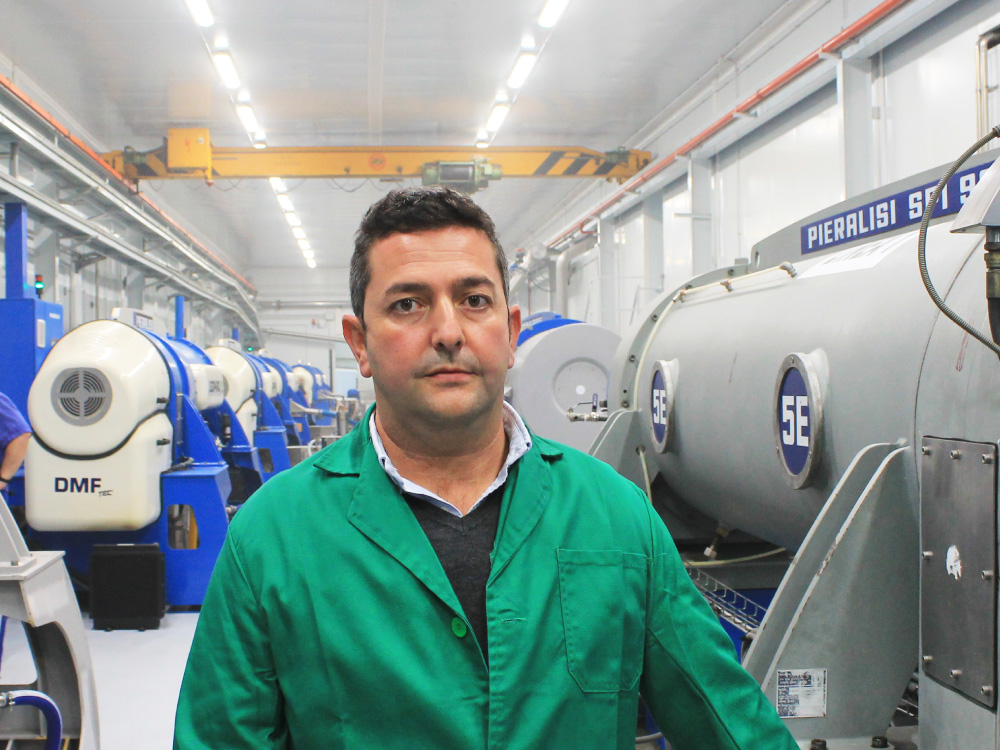
Ricardo García
Oil mill master at the associated cooperative Sor Ángela de Cruz in Estepa (Seville)
He is in his fifth campaign as head of the team in charge of extracting the olive juice.
He studied Agricultural Engineering at the University of Seville and specialized in Agroindustrial Plant Design. He joined this associated cooperative in 2008 as a technical advisor to the associated farmers for the implementation of a set of environmentally sustainable agronomic techniques, certified by Integrated Production.
He took advantage of his permanent and close contact with the former master, especially during the olive harvesting and oil production campaign, to train himself in the skills and tasks of the oil master of the mill, taking over from 2017.
He summarizes his daily task in planning and directing the production process. That is, organizing from the reception of the olives to the classification of the oils in the cellar.
He considers that the incorporation of technology in the production process is very important, but the key to achieving high quality extra virgin olive oils is found in the fruit, the olive, “if the fruit is extraordinary in the mill we take care of not spoiling that quality”.
In his daily work he has verified that there are areas that give singular oils, “the majority of olive groves in the region give a good extra virgin olive oil but not all of them are singular”, putting the focus on the dry land areas and with a deficit irrigation.
In the industrial component of his activity he affirms that all the improvements of facilities are welcome since once incorporated, it is very difficult to spoil the quality of a fruit in the extraction of its juice. Here he insists again that “technology, automation and self-digitization are fundamental”.
From his apprenticeship with the previous master he wants to highlight his insistence on having the ability to make decisions before the olive enters the mill. “From the beginning I have poured my work into sorting olives and not oils. Batches of very good olives give very good oils. Again, technology is our ally, thanks to it the farmers communicate before they arrive from which plot they are going to take the olives, which allows us to make an optimal planning of the reception of the olives.”
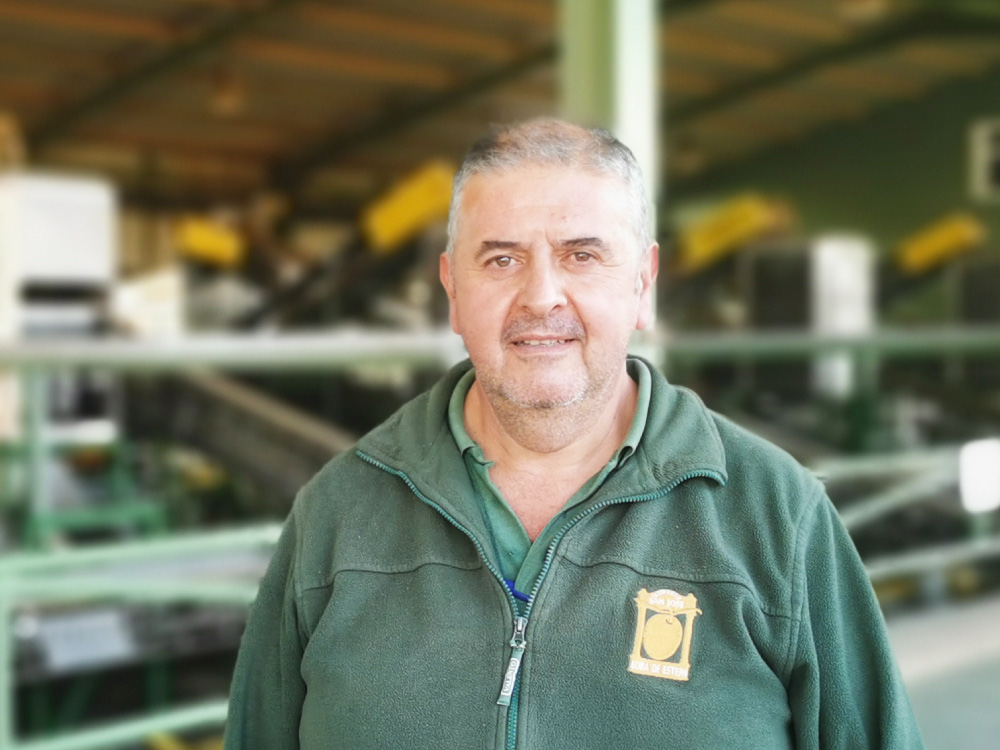
Manuel Borrego
Oil mill master at the associated cooperative San Jose de Lora de Estepa (Seville)
Manuel Borrego is immersed in his seventh campaign as Oil Mill Master at Olivarera de San José de Lora de Estepa (Seville). But he has been linked to this cooperative for many more years, learning from the hand of his master Francisco Espinosa.
In the middle of the harvest campaign, he summarizes his work highlighting the selection and organization of the fruits to be milled. Once the delivery has been made by the farmer-member, his work consists of supervising the loading and unloading and the coordination between the mill’s human team.
The former mill master insisted on the importance of knowing the oil and recognizing the quality of the olive juice. For this reason, he has combined his work with that of taster, forming part of the Oleoestepa tasting panel. Having the ability to recognize the exceptional quality of an extra virgin olive oil is fundamental to not make mistakes in his work.
He was fortunate to experience a radical change in the production process. With the arrival of new technologies, he remembers gladly how difficult it was to learn to get used to the new machinery, and how they have continued to evolve and advance.
In his opinion, to obtain a good extra virgin olive oil it is essential to have a good selection of the product and a quick milling, before the first six or eight hours, so that the olives do not have time to spoil. Time is gold, and in this case, liquid.
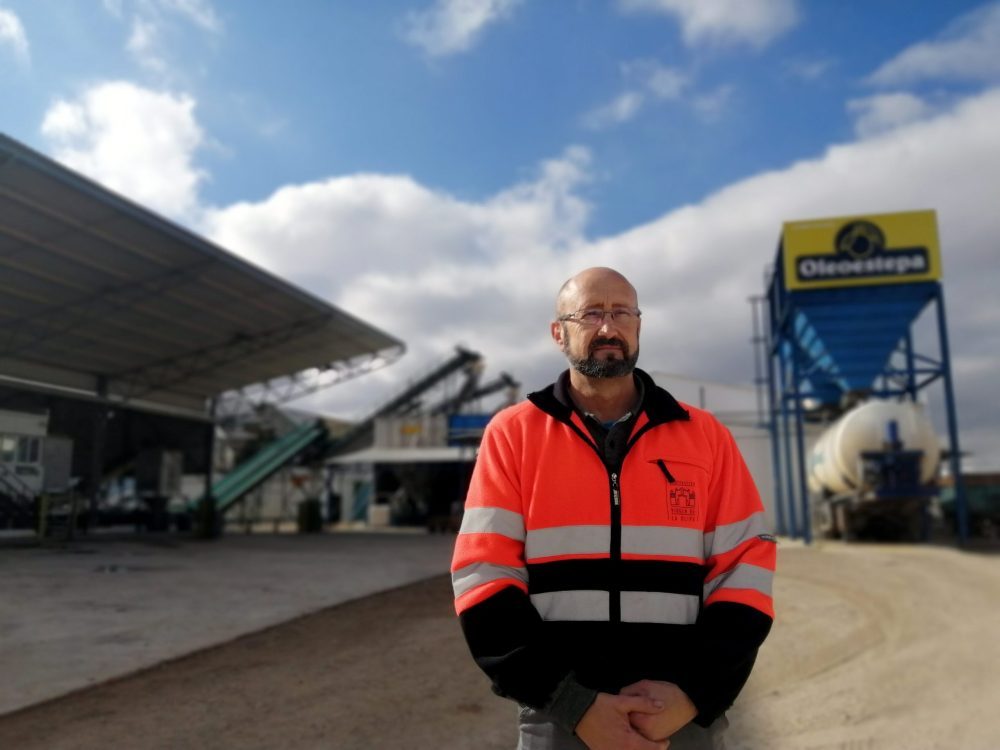
Carlos Javier Ruíz
Oil mill master at the associated cooperative Virgen de La Oliva in Mollina (Malaga)
Since 1989 he started working in the helper mill, but by chance in life he soon had to take over the reins of this oil mill.
Although he highly values all that he could learn from previous teachers, his passion for this work made him interested in other ways of doing things. “In these 32 years, continuing training has been key throughout this period, visiting other oil mills, taking courses, reading studies, attending technical conferences … in this work I find you never stop learning”.
He also highlights the great importance of his knowledge of mechanics, that has allowed him to solve problems that at that time did not have a right answer from the industry.
Looking to the future, he regrets the loss of human resources both in the olive grove and in the oil mill, seeing as difficult an adequate generational change at this time. However, he hopes that the future is better for the field, necessarily having to go through its complete professionalization.
In his long career, he has seen a great evolution throughout these years, such as the shortening of the campaigns. “In the nineties he used to end in late March or early April, however, now they end in mid-February at the latest.”
The recent integration to the cooperative project of Oleoestepa has been a plus of demand. For this reason, the details have to be taken care of even more, reducing the milling hours, maintaining a maximum cleanliness of the facilities, carrying out a cold extraction and of course, counting on the collaboration of the associated farmer in the care of the olive grove and an adequate collection. of healthy olives at the right time.
Looking back, he remembers the great cultural change in the way of determining the quality of oils both in the mill and by the consumer. Before, ignorance made the consumer value “esparto mat oil” more than the current extra virgin oils. “Fortunately, the consumer is more informed, which means a greater appreciation of higher quality oils.”
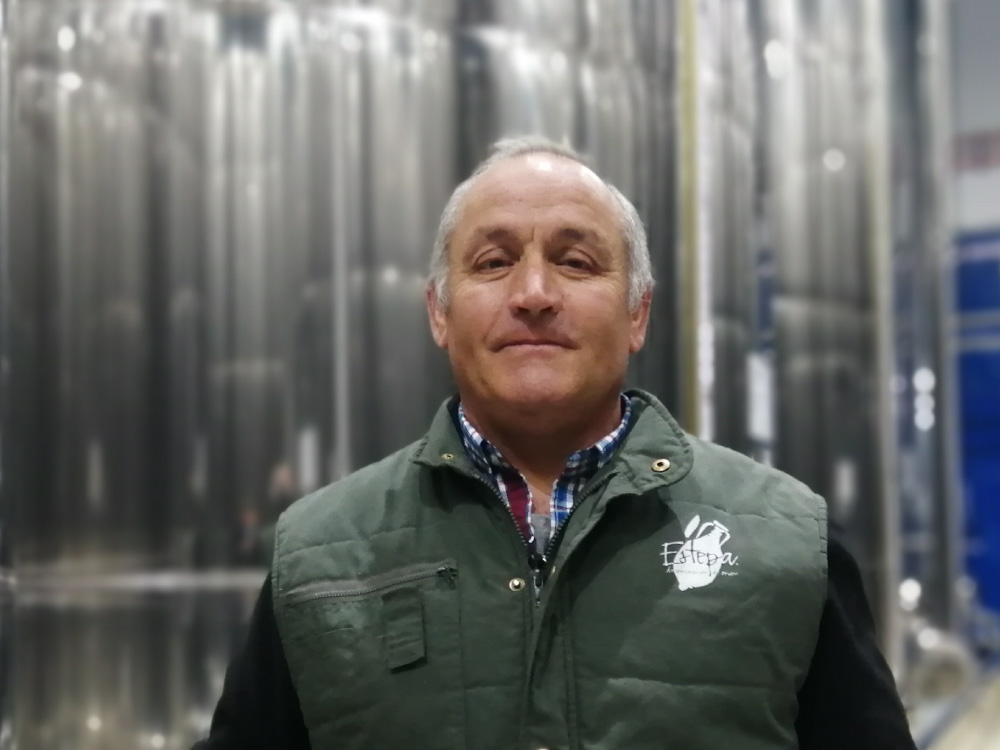
Juan Maldonado
Oil mill master at the associated cooperative La Inmaculada Concepción de la Roda de Andalucía (Sevilla)
Within last five years he has been working as the head of production at this oil mill have served to confirm that working on the front line requires great responsibility and stress. The main reason is that “the difference of quality between one olive oil or another can be only tenths of fruitiness in the tasting, fundamental for an extra virgin olive oil to be different from the others”.
Before working as a master miller, he worked for 27 years as an assistant to the previous master miller, with whom he was lucky enough to work side by side, proving campaign after campaign that, to do this job, it´s necessary a comprehensive knowledge of the mill and the machines that make up it. “Knowing when and how to make the changes into the extracted process is key to having a perfectly synchronized oil mill.” For him all knowledge is welcome, “but above all you are in loved with the EVOO, because you have to put a lot of love into it.”
During the campaign he puts the focus of his work on an ideal classification of the fruit, “knowing how to differentiate the varieties and the different qualities within them is key to achieving the highest quality in the olive juice.”
Outside the campaign, in addition to managing the oil cellar, he performs maintenance work. As the old oil master instilled in him, it is necessary to have a complete knowledge of the machinery of the mill, “because, although the mill closes its doors at the end of the campaign, the work continues from the door to the inside”.
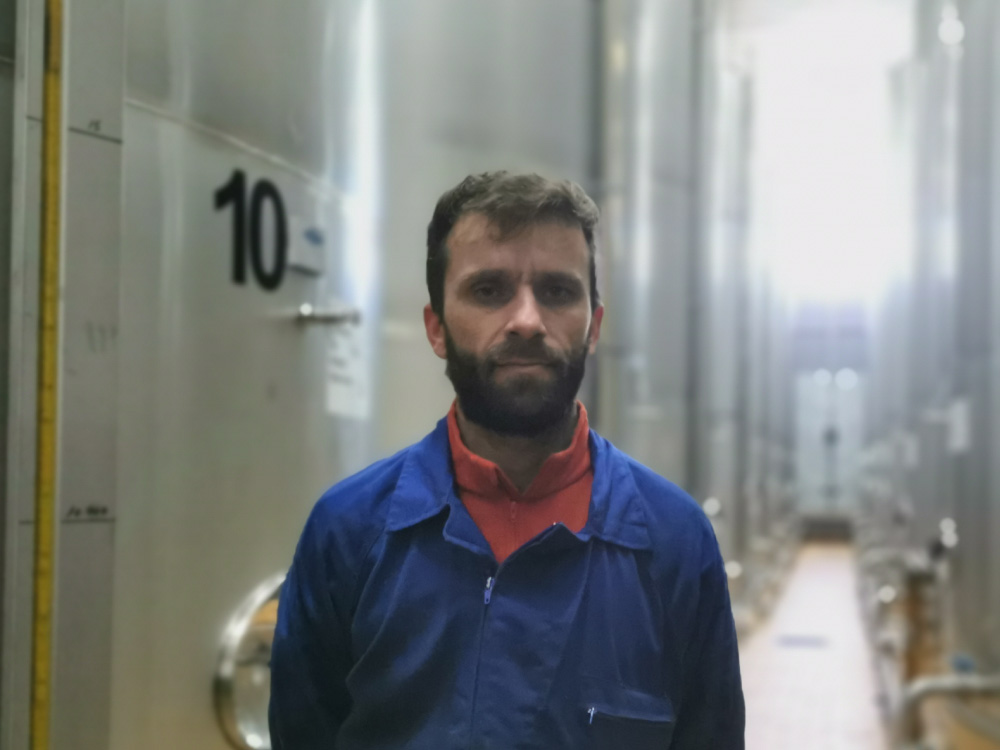
Pablo Gálvez Jurado
Oil mill master at the associated cooperative La Purísima de Herrera (Sevilla)
Although he has been working as an oil mill master for 13 years, his life is closely linked to this cooperative. In fact, he confesses that he was born in it, in the doorman’s house, his father.
Prior to working as a miller, he began his activity in the oil mill 27 years ago as an assistant in olives reception zone. Later he went on to work in the mill where he learned many secrets of olive juice extraction.
During the campaign, his function is based on always having the machinery ready. “An optimal maintenance of the machines is essential to avoid problems during the milling, centrifuging and decanting of the oil, which prevent achieving the best possible extra virgin olive oil or, worse still, cause defects in the juice”.
“Controlling the levels, the dough and the grinding time is essential, and for this, all the machinery must be in an optimal state” explains Pablo. After the campaign, it is time for cleaning and maintenance for optimal conservation of the industry, “so that when the next campaign begins everything is ready and we can obtain a high-quality extra virgin olive oil”.
To develop this job, he points out that he has needed “hours and hours of learning, training and dedication”, highlighting the value of the continuous training provided by Oleoestepa in its technical courses for oil miller masters.
In his opinion, the secret of a high-quality extra virgin olive oil lies in multiple factors, among which the maximum cleanliness of the fruit and machinery, early harvest and cold extraction. “Here all these steps are carried out in an estimated time of two hours. Time is also crucial for achieving a maximum quality juice”.
Pablo can’t help remembering his father when he walks through this cooperative. He remembers with great nostalgia the children’s games in the patio of the mill, while his father worked in the doorman’s mill. “I have the enormous satisfaction of knowing that my father would have been immensely proud to see me as a master oil mill in the same cooperative to which he dedicated so much time.”
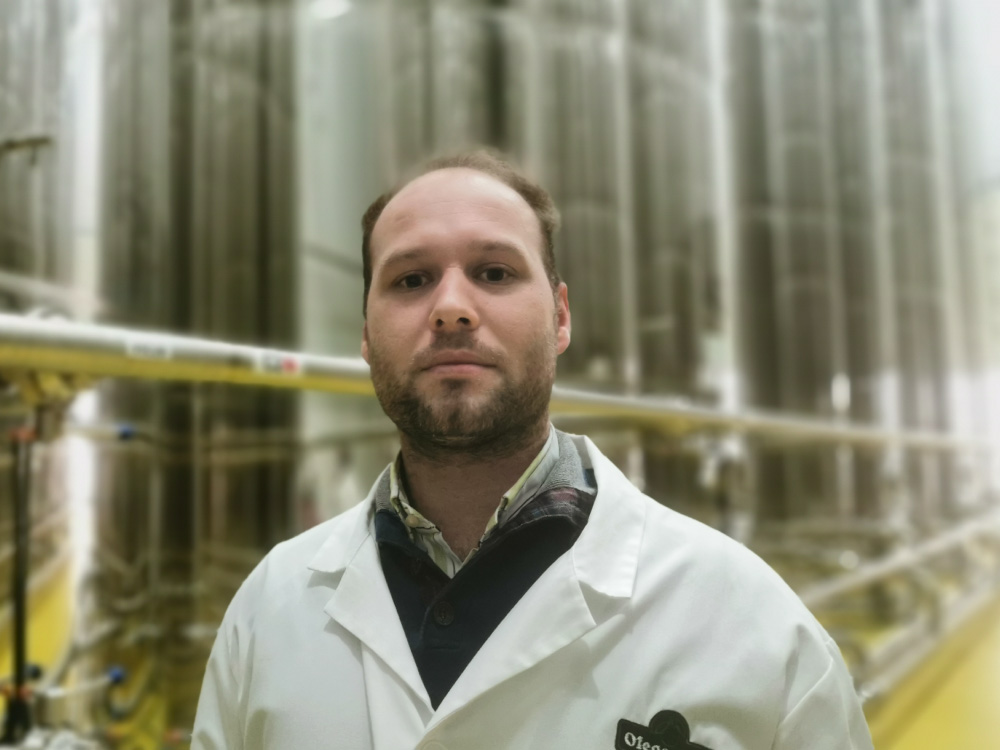
Arístides Sevillano Suárez
Oil mill master at the associated cooperative Agropecuaria in Herrera (Seville)
Arístides Sevillano Suárez, oil master miller of the associated cooperative Agropecuaria in Herrera (Seville).
About six years ago, when the oil mill merged with the table olive cooperative, the need arose for a production management that would encompass both activities. It was at this time that Arístides appeared on the scene as the person in charge of the quality of the olive oils produced in this mill.
During this period, to his technical studies in Agricultural Production and Production Supervision he has been adding the continuous technical training that Oleoestepa periodically programs and new studies of Technician in Process and Food Quality. “Technical information is fundamental, but also knowing how to value the product,” Arístides points out as the main reason for developing tasting courses, also given by Oleoestepa.
During the campaign it is more complicated for him to combine his work as production manager with his training as a Process and Food Quality Technician and the training courses to belong to the Oleoestepa tasting panel, but he points out that “this extra effort compensates me because it has a direct application on my daily work in the mill”.
His task in the cooperative is focused on directing all the operations of this industry, as well as the management of the raw material and the human team. Before the campaign, he directs the preparation tasks to guarantee a total set-up. “During the campaign, I prioritize my efforts to convert the raw material provided by our farmers into the best extra virgin olive oil possible”. In his opinion, maximum cleanliness, minimum time (6-7 hours) and temperature always below 27ºC are the key factors for extracting a juice with the best possible organoleptic properties from the olives harvested by the associates.
Looking back, he highlights what the commitment to excellence has meant for the mill. “The cultural change and the way of doing things has been spectacular. Although we have had the support of the old master, I would like to convey my pride and gratitude to the entire technical team of the mill; together we are making it possible”, concludes Arístides.
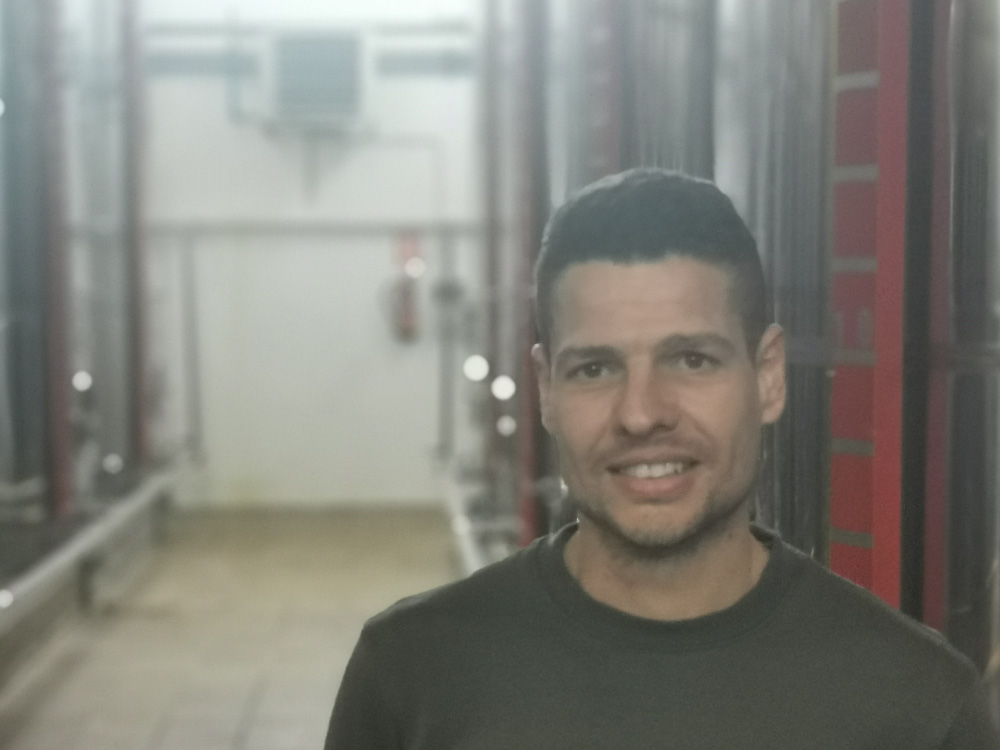
Pedro León Candelaria
Oil mill master at the cooperative associated Olivarera San Plácido in Badolatosa, Seville.
Pedro León Candelaria, oil master miller associated with Olivarera San Plácido in Badolatosa, Seville.
Six years ago he started working in the mill, performing all the tasks in the process of olive juice production as an assistant to the master, before achieving the position of oil master miller two campaigns ago. The experience gained as an assistant has been fundamental in his learning process, but even more so the technical training. “Luckily, during this period I have been able to count on Oleoestepa’s continuous training by taking different courses ranging from technical and mechanical issues to learning how to taste extra virgin olive oils, something fundamental for this job,” Pedro points out.
During the campaign, his work does not end until he has milled all the olives harvested that same day. Pedro considers the emotional component to be key in this job, with which he can overcome the pressure of the day to day, pointing out that “in the campaign there are no timetables, sometimes it ends at midnight, sometimes at 4 in the morning, but to get a high quality juice you can’t leave anything for tomorrow, time is essence”.
The fact that the San Placido cooperative is the smallest entity associated with Oleoestepa, serves as a spur to the whole team that composes it to give the best of each one in order to compete with larger mills with more technical and human resources. In this line Pedro considers that “I make a good team with the manager of the cooperative, we are young and we understand each other very well, we go to one and that shows in the final result, in the high quality of the olive juices that we achieve”.
His task as master does not end with the end of the campaign, then begins the maintenance and tuning to make it ready for the next campaign. Cleanliness and “fine” machinery are his pillars to achieve extra virgin olive oil extraction with the best organoleptic qualities, for this, time is his main challenge. “Quality lies in achieving a milling in the shortest possible time but always in cold; it is easy to say, but very difficult to achieve”.
Pedro recalls how his situation in the cooperative changed, practically from one day to the next, “I would come in and they would tell me to do this or that, and suddenly, they offered me a position of maximum responsibility, too big for a young man like me”. Despite the stresses and strains experienced, especially during the first campaign, today he looks back with pride and satisfaction at having overcome this challenge.
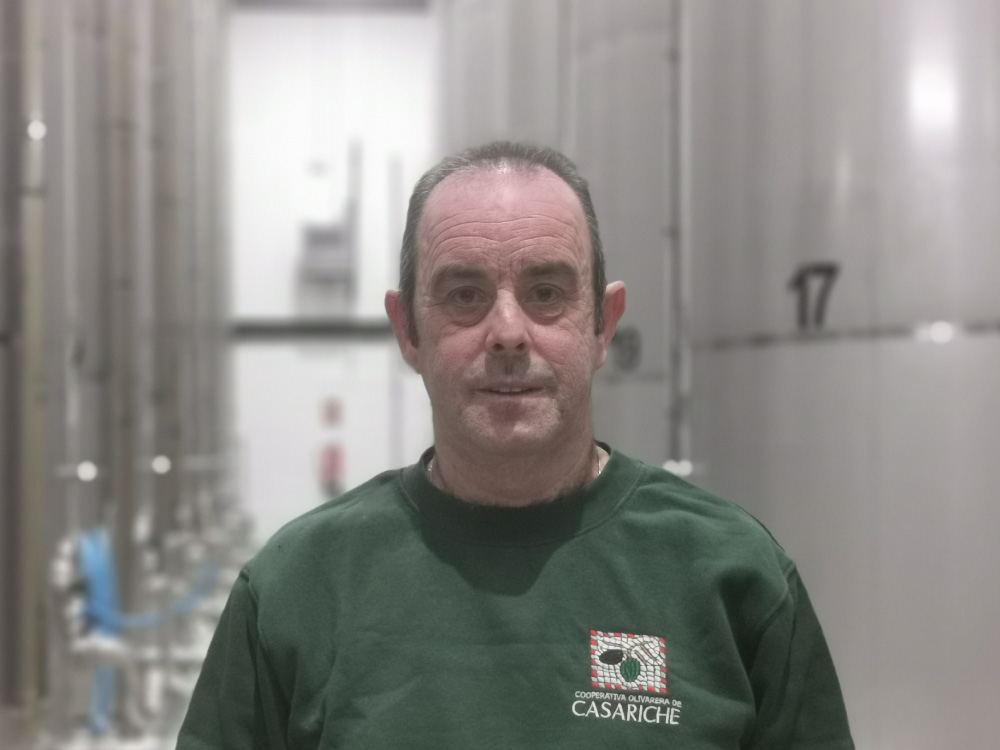
José Jesús Marín Pozo
Oil mill master of the Cooperativa associated Olivarera de Casariche (Seville).
José Jesús Marín Pozo, oil master mill of the Cooperativa Olivarera de Casariche.
José Jesús, better known as “Pepe”, has been in charge of the mill for 20 years. But his link with the associated cooperative of Casariche is more extensive, since he began working in 1988, almost 35 campaigns ago. Throughout this period he has held all the positions in the cooperative, from working in the area of olive reception and cleaning of the mill to becoming master of the mill, a position he currently holds. “A professional who has carried out all the tasks has the privilege of having an integral vision of the entire production process, which allows him to propose solutions that go beyond my specific work,” Pepe points out.
In describing his work as a master, he points out that, although there is an important peak of work during the campaign, after it begins what we call the “quiet” work: cleaning and maintenance of the machinery. “This work is key to have a campaign without scares in the plant and to achieve the highest quality oil,” says Pepe.
Looking back, he is struck by how much things have changed over the years, how technology has been introduced in the mill, facilitating production and allowing higher yields and better quality. This technology has also meant a necessary professionalization of the team in charge of the mill and of the farmers. In this sense, he still remembers how the olives were piled on the ground and left for several days. On the other hand, “now we clean everything with great tenacity so that the fruit arrives in perfect condition and we obtain the highest quality extra virgin olive oil,” says Pepe.
He recalls with a certain nostalgia that when he arrived at the cooperative there were no decanters, since the first ones were installed in 1989, “while I was doing my military service”. There was also no weighing program, so they had to weigh, unload and reweigh the tractors to calculate the difference. Of course, there were also no washing machines, and many other technologies that today are essential to extract the juice from the olives with the highest possible quality. He even recounts how some farmers used to transport the olives in sacks, realizing that “it is impressive the change that has taken place in the cooperative since I started working here”.
“Before, the objective was to obtain the maximum olive oil possible, but nowadays the focus is on quality”, Pepe points out, and he considers that these changes go hand in hand with technology, since technological improvements have improved olive yields and have favored the prioritization of quality over quantity.
Although today we all understand that these changes have been positive and favorable, Pepe tells us that there were many people who were against them at the time. And the fact is that change is always hard. Little by little, with the imposition of Oleoestepa’s internal rules and with generational changes, all these changes were assimilated and accepted, making today’s olive mill possible.
In addition to all these changes, Pepe also talks to us about extra virgin olive oil and affirms that it is essential that the fruit is healthy and clean. Also the cleanliness of all the places where the fruit has to pass through, i.e., the conveyor belt, pipes, mill, etc., and of course, a good adjustment of decants to avoid spoiling the mass.
He also highlights the importance of correctly classifying the oils, because “although all olive oils are extra virgin, we can find more or less quality, and it is very important to have trained personnel to be able to correctly classify the oils, which is why he congratulates the great work of the laboratory and tasting panel that we have at Oleoestepa”.
In the 34 years that Pepe has been with this cooperative, he has had many anecdotes, some accidents such as the overflowing of some oil tank, and other very happy ones, such as the birth of his daughter just the day after the end of the campaign. “It couldn’t have ended better.
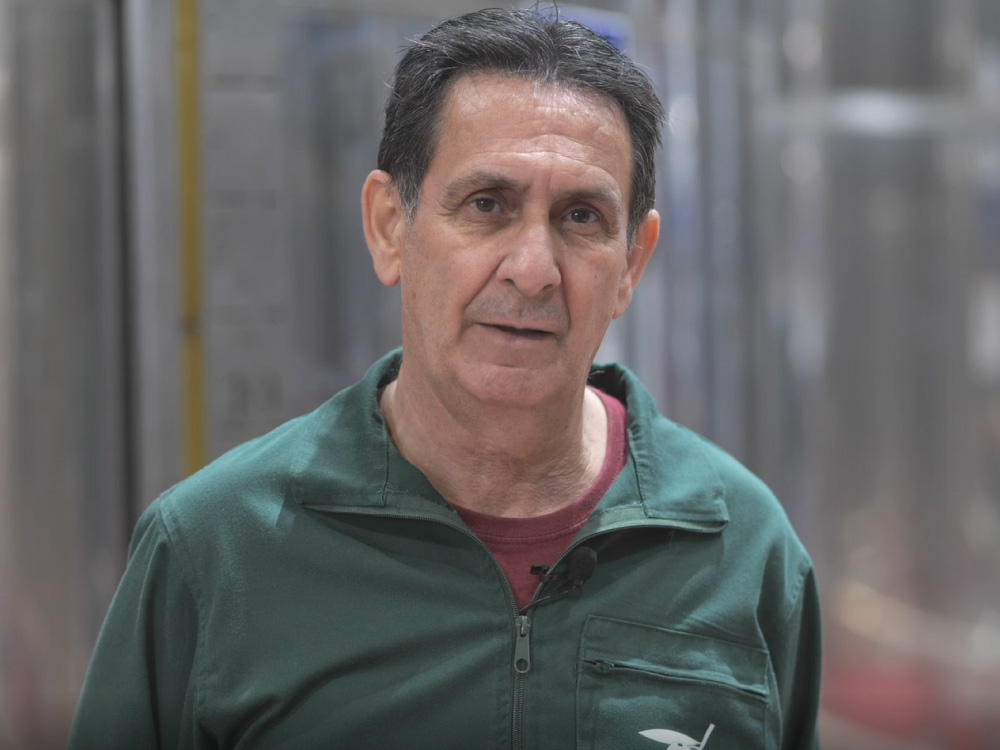
Manuel Fernández Fuentes
Oil mill master of the cooperative associated Olivarera de Nuestra Señora de la Paz in Estepa (Seville).
Manuel Fernández Fuentes, master of the oil master miller at the associated cooperative Nuestra Señora de la Paz in Estepa (Seville).
In 1999 he began to carry out the work previously carried out by his father. He recalls that his first days were very difficult until he managed to adapt to the responsibility of his job.
In his opinion, the most important thing to obtain a high quality extra virgin olive oil is to keep the temperature under control at all times, to ensure that no emulsions are produced in the mixer and to carry out a good separation.
During these more than 20 years of experience as an oil master miller master, he emphasizes that the most revolutionary moment was the change from hydraulic presses to the current continuous lines. “With the old system of hydraulic presses, the olives were in the hoppers for a longer period of time, which was heating and stunting the fruit, resulting in oils of poorer quality,” Manuel points out. The incorporation of the latest technology machinery that allows continuous extraction of the olive juice has meant a faster and cleaner process and, consequently, “a very significant help to obtain a higher quality extra virgin olive oil”.
His years of experience have also shown him that it is essential to have knowledge of oil tasting. “Identifying smells and flavors, and knowing how to classify extra virgin olive oils according to their qualities is key to avoid mixing worse oils with better ones” Manuel points out. Being a member of the Oleoestepa tasting panel has allowed him to taste a multitude of oils, of different varieties and origins, confirming the great complexity and richness of flavors and smells of olive juice.
Finally, Manuel confesses that in his day to day life what he likes most is to be in the day to day production of extra virgin olive oil, enjoying all the tasks involved in achieving an extra virgin olive oil of the highest quality.
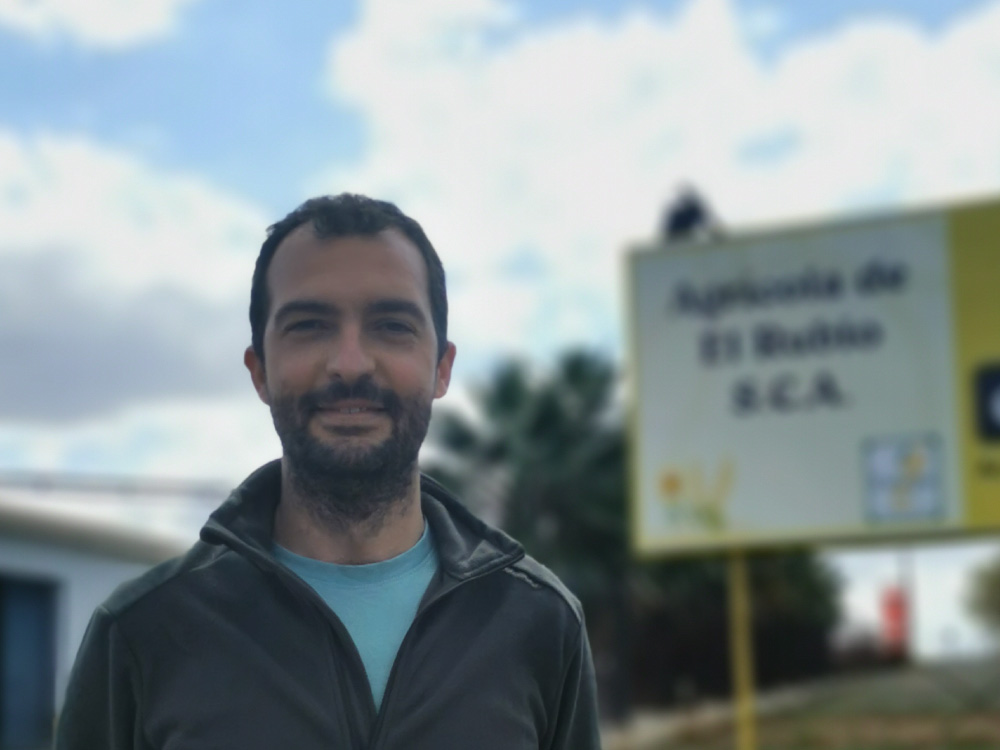
Manuel Fernández Fuentes
Oil mill master of the cooperative associated Agrícola de El Rubio (Seville).
Jesús Ramos Jiménez, oil master mill cooperative associated Agrícola de El Rubio.
Just with the completion of a training cycle of oil production and extraction and practices in another associated mill, he had the opportunity to start his professional activity as a miller in the associated cooperative of El Rubio in the campaign 2004/05. That campaign was special because all his colleagues were new. Jesús recalls that “although they could not count on the support of the experience of old technicians, we made up for it with a lot of enthusiasm and commitment. It was hard, but together we set the new production project in motion”.
He considers training to be key to this project. He recognizes that “although experience is important, it is essential to be up to date with the latest developments; in addition, Oleoestepa’s technical courses allow us to share experiences and learn from the experiences of other masters”.
During the campaign, he focuses all his attention on supervising all the factors that determine the quality of the resulting juice: the condition of the olives received, machinery, indicators, etc. He confesses that “he is very well supported in this task by all his colleagues, because we are all clear about what needs to be done to achieve quality and we are all working together”. Because they have recently increased the milling capacity, the olives that enter the cooperative are in the torva less than 24 hours. Because the speed with which the extra virgin olive oil is extracted from the olives is fundamental, he explains to us that the milling ends every day around 4 or 5 in the morning, and then they have to get down to cleaning and leave everything ready for the next day, “there are even days that we don’t stop, we are there 24 hours, it depends on the amount of olives that come in that day.”
He tells us that for his cooperative the best way to classify the olives is by varieties, since all the olives of the same variety are in a similar state and this allows him to know that all the juice obtained is going to have the same quality.
He proudly affirms that all the farmers who are members of the cooperative are very aware that “things have to be done well from the field”, because as Jesús tells us the cooperatives do not have a magic wand to be able to extract a good olive oil from a bad fruit.
When the campaign is over, they start with the cleaning of the mill and the assembly in the factory. It is essential to leave everything ready for the next campaign.
In his opinion, although there are several factors to achieve a high quality extra virgin olive oil, Jesús focuses on time: “the less hours the olives are in the mill, the better”.
Finally, he confesses that being an oil miller master is a vocation, because “you have to dedicate a lot of time and many hours that you take away from your family and friends”.
Francisco Jesús Berral Torres
Oil master miller at associated cooperative Olivarera Pontanense in Puente Genil (Córdoba).
Francisco Jesús Berral Torres, Oil Master Miller at cooperative Olivarera Pontanense de Puente Genil (Córdoba).
With this campaign just finished, Francis, as he is known by his friends and family, has been directing the associated mill in Puente Genil for more than fifteen years. But there are many more linked to the world of the olive grove. “I come from a family linked to the cooperative world of the olive grove, oil runs through our veins,” says Francisco.
In his childhood memories, agriculture and the olive grove are always present, and he gets excited when he remembers that in the afternoons he used to accompany his father in the tractor to the cooperative and “the joy he took me when the old teacher, Marcos, gave him steel rollers to play with the skateboards”.
Before becoming a master, he started as a maintenance worker, learning all the secrets of extra virgin olive oil production from the old master and the extreme care with the machinery. Outside the campaign he combined this work with the maintenance of the cooperative, which helped him to know deeply all the technical issues of the mill.
During the campaign he focuses his attention on the control of the olives from the moment he empties the trailer until the oil leaves the cellar for bottling, confessing that the most complicated part is the reception, since “I still have to explain to some farmers the importance of bringing the olives unpolluted; fortunately there are fewer and fewer of them”.
He considers that to be an oil mill master, continuous training is crucial, in order to keep abreast of the latest technical innovations. As a restless person and lover of everything that surrounds extra virgin olive oil, he takes advantage of all training opportunities in the form of courses, workshops, presentations and technical forums to keep up to date. She emphasizes how the culture of excellence is internalized in the Oleoestepa masters. “There is a very healthy competition among us to achieve the best olive juices and when we leave our environment, we realize that not everyone has the same vision and dedication.” In this regard, he tells us the anecdote of attending a course for teachers in which the practices of the oil mills associated with Oleoestepa were always used as an example.
Finally, he tells us a story that he still remembers with displeasure and sadness, the day the mill was robbed of 5 trucks of extra virgin olive oil, 128,000 kg, and with joy, he points out that “the oil was stolen from the mill, 5 trucks of extra virgin olive oil. And with joy, he points out that “when we have received awards it is a reward for all the sacrifice we make and it helps us to reinforce our commitment to excellence, it is worth it”.
Francisco Jesús Berral Torres
Oil master miller atassociated cooperative Agrojara in Martín de la Jara (Sevilla).
Pedro Aroca, oil master miller at the associated cooperative Agrojara in Martín de la Jara (Seville).
Although he has been working as an oil master miller for 4 campaigns, he has been professionally linked to this cooperative for more than 20 years. “It seems like yesterday when I started to control the reception of olives”, Pedro recalls, “and after a few campaigns I became assistant to the previous master, where I learned the reality of this profession”.
Despite having studied business administration, Pedro likes field work more. “From the beginning this job awakened in me a passion for mechanics, so I had to face my initial lack of knowledge with many tests and more mistakes, and stick to the previous master to learn as much as I could” confesses Pedro.
Pedro confesses to us that the integration of Agrojara in the Oleoestepa cooperative project two campaigns ago now has meant a significant change in the way of doing things.
“Before starting in Oleoestepa, at reception they only separated the olives picked from the ground, crushed them, sent them to the winery and that was it, they could sell their oil. Today, with the help of Oleoestepa’s technicians, the changes are very evident, which has allowed us to advance faster towards the achievement of higher quality olive juices,” says Pedro gratefully.
He goes on to give us examples of the main changes that have brought about this new approach to EVOO production. “Prioritizing the quality of the best deposits and making physical-chemical, multi-residual and sensory analyses of each of the deposits, among other changes, has allowed us to analyze and discover “mistakes” that have been made during the process, so that learning is continuous and its positive effects are evident” explains the master.
During the campaign all his attention and efforts are focused on obtaining the best extra virgin olive oil possible with the raw material that enters the cooperative, “there are already many farmer-members who understand that a quick delivery of healthy and clean olives is fundamental, because it is impossible to obtain a good oil from a bad fruit” confesses Pedro.
Once the fruit is received in perfect condition, in his opinion, the keys to obtaining an excellent extra virgin olive oil are cleanliness and temperature control, always below 27 degrees, that is, cold extraction. And of course, crushing the olives as soon as possible.
In these twenty years there are many memories that come to mind, but he remembers his first stressful days at the cooperative during the night shift without knowing the cooperative or having any experience in his job.
Diego Rodríguez Sancho
Oil Master Miller at the associated cooperative San Juan cooperative in Villanueva de San Juan (Sevilla).
Diego considers himself a lucky man. At least he was 21 years ago when he started his professional activity in the cooperative thanks to a lottery in which he was chosen randomly among a dozen candidates. “It’s funny how a moment of fortune can mark a person’s career path, and of course, his life,” Diego confesses.
At that time there were two masters, in charge of training them and passing the baton on to them years later, when he became a master olive oil maker, that is, responsible for the production of extra virgin olive oil in the associated mill located in Villanueva de San Juan, in the heart of the Sierra Sur of Seville.
As for his work during the campaign, Diego is clear that “whoever is looking for me is sure to find me in the olive unloading area”, as he considers a proper selection of olives to be key to achieving top quality juice. “Once all the olives have been received, it’s time for the second part, supervising that everything is in order in the mill,” says Diego, also pointing out that cleanliness is an indispensable condition in the entire production process.
Once the campaign is over, his main tasks are a review and overhaul of all the machinery, renewing those that are technically obsolete.
The associated cooperative of Villanueva de San Juan has the singularity within the Oleoestepa group of being located in the mountains, which significantly marks the agronomy and the organoleptic properties of the resulting juice. “Here the main enemies are frost and the fly, which fortunately is not so common in the territories of the associated cooperatives,” Diego points out.
Looking back, he is struck by the relevant consideration that cleaning has achieved in recent years, as a key factor in achieving top quality olive juices. In this regard, Diego recalls that “when I started, the mills were full of mud, branches and other debris from the harvest, whereas now you can eat on the floor”.
As for the integration of the oil mill in the Oleoestepa cooperative project seven years ago, he considers that it has been a before and after, with many outstanding benefits. “Before, they did not control the temperature and it was after joining Oleoestepa that they began to receive technical advice and to take into account these decisive factors in milling,” says Diego, who is very grateful for Oleoestepa’s continuous training courses, with which he is able to keep up to date with the latest developments in the sector.
Throughout all these years, Diego has collected many anecdotes, among which he recalls with relief how one night while he was working in the mill they broke in. “Fortunately, it all turned out to be a big scare.
Antonio Palacios Romero
Oil Master Miller at the associated cooperative San Nicolás in Marinaleda (Sevilla).
It was with the turn of the millennium when he began his professional relationship with this cooperative. Although he started as a miller, thanks to his love of mechanics, he soon became in charge of technical maintenance and in a couple of years he assumed the maximum responsibility in the production process of extra virgin olive oil in this mill.
In addition to having learned from his elders, he has also had to learn many things on his own, because he confesses “when you like your job you never stop thinking about what you can improve”.
During the campaign, he starts his activity at 2 p.m. with the opening of the unloading area for the olives harvested that morning, so that the milling process is as fast as possible, of a fresh and healthy fruit. “We know at what time we start, but never at what time we finish each day,” Antonio tells us, as it depends on the amount of olives delivered that day and if there has been any incident in their extraction. And the day does not end once the olives have been milled; everything must be left completely clean and ready for the next day.
At the San Nicolás cooperative they have two reception lines and two clarifiers, so that when one is full they can continue working without stopping and thus not waste time.
When it comes to determining the key to obtaining a good extra virgin olive oil, Antonio focuses on receiving fresh, healthy olives at their optimum point of ripeness, which is why he considers the work of the farmer to be fundamental. In his field, cleanliness, time and temperature are the two most relevant factors in achieving a high quality olive juice. “That everything is always clean and that the entire extraction process is carried out below 27 degrees in the shortest possible time are my main concerns,” says Antonio.
Antonio recalls with pride and emotion all the moments he has spent working, all the hours he has spent in this cooperative and all the efforts he has had to make to solve every unforeseen event that has arisen in all these years. “All the efforts are worth it when campaign after campaign we can enjoy an olive juice full of quality and affection” Antonio confesses to us to end this interview.
Felipe Gómez Arjona
Oil Master Miller at the associated cooperative Olivarera de Pedrera (Seville).
His professional life is closely linked to this cooperative since, despite his youth, he has been working in it for 18 years. “The first years I was dedicated to weighing the olives in the reception area of the mill, but in the fourth campaign I was given the opportunity to work as a teacher and I didn’t turn it down,” Felipe recalls.
The first years as a master were tutored by the senior oil master miller, who taught him all the secrets and tricks to get the best out of the machinery available at the time. Felipe confesses that “now things have changed a lot since then and practically everything is different, looking back I realize that I have lived through all the great changes that this cooperative has undergone since its origin”. For example, the same year he started working in the cooperative they added a new line of work and he was the first to use the new weighing system. “Until today, when we have the best technology for the extraction of the olive juice, we have lived a technological revolution within these walls,” Felipe points out.
So much innovation in machinery and processes has made continuous training essential. For this reason, throughout this time he has not missed any training opportunity to keep abreast of the latest developments in the sector. In this aspect, he values very positively the training courses for oil master miller that Oleoestepa periodically develops, which they try to attend together with the whole team of the mill. In addition to these courses, he considers it essential to deepen the knowledge of sensory analysis by masters. “To know if we are getting an extra virgin olive oil of the highest quality, it is essential to have a broad knowledge of how to taste, to identify attributes and defects in the juice obtained,” Felipe confesses.
His daily activity in the mill throughout the year is divided into two moments: during the campaign and outside of it. Usually from October to January are the most difficult and stressful months, since the continuous and detailed supervision must be permanent. “The pressure is important because a single mistake can ruin an entire tank in the winery,” Felipe points out.
Outside the campaign, his activity is focused on the maintenance and improvement of all the industrial components of the mill, so that “we can start the next campaign on the right foot and without any surprises”.
In his opinion, a key factor in achieving top quality olive juice lies in an adequate selection of the olives in the reception area. “Having several extraction lines allows us to classify the olives according to variety and condition, achieving oils with very homogeneous profiles.” And Felipe adds that “what comes bad we can do very little with them, more than put them together and separate them from the rest. It is better to concentrate on what is good, to extract the juice with the best possible qualities”. To do this, he believes that “time is money” and that the olives should be milled immediately after reception and preparation.
In more than 20 years that he has been in the cooperative he has had time to live infinite anecdotes, but what surprises him most is how everything has changed and the way of working in the mill, concluding in this respect that “unlike what the consumer usually thinks, technology is our great ally”.
Juan Miguel Vega
Oil Master Miller at the associated cooperative Arbequisur in Aguadulce (Seville).
Juan Miguel Vega, Oil Master Miller of the associated Cooperative Arbequisur in Aguadulce (Seville).
His professional career began at the turn of the century. Without previous experience, the first years were very stressful as he had to combine work and intense technical training at the hands of Oleoestepa.
During the campaign he focuses all his efforts on coordinating with the field technicians to make forecasts of the quantity and quality of olives that have to enter the mill for proper planning. Juan Miguel recognizes that “it is key to know the quality of the fruit in advance for proper classification”.
Outside the harvesting season, his work focuses on the maintenance and fine-tuning of the existing machinery in the mill. “Contrary to what it may seem, the activity is very intense during these months, which are essential to have a smooth campaign,” Juan Miguel points out.
Although the fact of having a healthy olive, together with its proper classification, is key to achieve a high quality extra virgin olive oil, this is in the hand of the farmer. In his hand is cleanliness is the determining factor. “Getting good oils is a job for everyone, so important is the work of the farmer in the cultivation and harvesting of healthy fruits at the right time, as those of the mill masters in achieving an optimal extraction of its juice” confesses the master of the associated cooperative.
He points out that his oil mill, Arbequisur, is special in that it is practically monovarietal. “The Arbequina variety is the protagonist in our mill, which means extra care because it is a more complicated olive, unstable and difficult to process”.
His most positive experiences are closely linked to the recognition received over the years in the form of national and international awards for the quality of the oils produced. Likewise, he recognizes that the visits of consumers to the mill are very comforting since “they allow us to tell and value our work in this sector”.
Antonio José Pradas Díaz
Oil Master Miller at the associated cooperative San Isidro de Gilena (Seville).
In spite of his youth, he has a long experience in the olive oil industry. As is usually recommended in management manuals, in these fourteen years he has gone through a multitude of positions and has performed all the tasks linked to the extraction of extra virgin olive oil. “This has given me a very global vision of how an oil mill works,” Antonio José tells us. As is usual in these cases, he started his professional activity from the bottom, as a factory worker, helping and learning from previous masters. His training in mechanics and his previous work in the surrounding quarries as a maintenance technician has been very useful in his new role as oil master mill, a responsibility he shares with his partner Lola.
“I consider that we make a good tandem, as her extensive training in the valorization of extra virgin olive oils, complements very well with my interest in machines. In short, I prefer to concentrate my efforts on having the machinery in optimal conditions to achieve the highest quality olive juice,” Antonio José confesses.
During the harvest campaign, his coordination with his partner Lola is total, adjusting schedules so that “all the work is done, all the olives are milled and the mill is sparkling clean to attend to the olive deliveries on a new day of the campaign period. We both share the eagerness for cleanliness, as we consider it to be a key factor in obtaining top quality oils”.
Once the campaign is over, the period of maintenance and improvement of the different elements that make up the mill begins. At this point he emphasizes the important bet of the current board of directors for the modernization of the infrastructure, which will allow them to inaugurate new facilities for the mill in the new campaign “in which we incorporate the latest technology in milling, beating, centrifuging and decanting”, he comments enthusiastically.
Although he has extensive training in mechanics, he knows that his strength lies in his knowledge of the organoleptic characteristics of the oils, which is why he has been combining his daily work with an EVOO tasting course given by Oleoestepa as part of its Continuous Training Program for the past few weeks.
“I know that we are a young team, perhaps not as experienced as other associated mills, but we make up for it with great enthusiasm and dedication to obtain top quality juices” confesses Antonio José at the end of the interview.
Francisco Javier del Pozo Gallardo
Oil master miller of the Roda Agricultural Cooperative in La Roda de Andalucía (Seville).
Son of an oil mill master, his link with the cooperative goes beyond the strictly professional. Although he started working in this cooperative in 1991, he had already spent some years sporadically helping his father, a former master of the cooperative.
After his retirement, the cooperative placed its trust in him as the person in charge of olive oil extraction in the mill. He laughingly tells us that “I learned by head-butting” and with the invaluable help of his father. “My beginnings coincided with a time of important industrial changes in the way of producing oil, from the old presses to a more dynamic system based on mixers and centrifuges, so my father’s technical recommendations were soon outdated”, and Francisco Javier recognizes that “from what there was to what there is today there is nothing left but the machinery shed and a centrifuge”.
This great change in the mill has also been noticed in its smells and its understanding. “I am very struck by how the smells that were once considered characteristic of a good oil are now assumed to be of poor quality,” because “before we had neither the knowledge nor the awareness to take care of all the details, for example, cleaning. Fortunately the physical work is over, in the vast majority of posts the same force is no longer performed as before, greatly facilitating the tasks and allowing us to concentrate on the details that can spoil the oil in its extraction process”.
But cleanliness is not enough, “technology is our ally and whoever does not want to understand this, will not obtain high quality oils” our master asserts.
Despite all the changes made, he understands that improvement is continuous, so he is immersed in the implementation of an integral traceability system.
And making this commitment to continuous improvement his own, he has not neglected his training during this period, taking courses both at Oleoestepa to learn about the oil mill and the courses of machinery suppliers, with which he learns all the secrets of “his best allies”.
During the campaign, his work consists mainly of coordinating everything so that nothing goes wrong. During the rest of the year, he does all the maintenance and improvement of the machinery, so that “everything is ready at the beginning of the campaign and to avoid problems”.
In his opinion, the secret of a good extra virgin olive oil lies in the care of the fruit. “If you pick a good fruit, you just have to try not to spoil it” Francisco evidences. “And of course it is also key to have a good team, and here I am lucky to have great professionals and better people”.
When we ask him about some remarkable experience in the cooperative, Francisco highlights the fact of “having been born in the cooperative”. His father was the former teacher and lived in the cooperative’s house until his retirement. Although he left his family home to start a family, when he became a new teacher, he was given his old family home and spent his first years with his family.
Gerardo Capitán Narbona
Oil master miller of the associated cooperative Olivarera Nuestra Señora de la Fuensanta in Corcoya (Seville).
Although the new campaign brings him to almost three lustrums of experience as an oil mill master, his professional link with the cooperative stretches back over two decades. “I started working in the cooperative’s office, but my training and interest in everything related to quality management made me keep an eye out for opportunities that arose in the mill, and that came after six years of combining my office work with the management of olive reception during the season, in the form of promotion to master miller”, Gerardo explains.
He considers that his knowledge of quality control has been key to his professional development as a master. “The technical training courses for teachers promoted by IFAPA and Oleoestepa were very useful for me, but it would not have been enough without the culture of quality that I received in my studies,” Gerardo explains. In fact, at the beginning, his obligation was to ensure the implementation of and compliance with the new quality standards. “Now they are complied with without a second thought, but it was not easy to make everyone (farmers and technicians) see the importance of complying with quality standards, it was a constant struggle”, Gerardo recalls.
This demand for sustainability has also been extended to the level of sustainability. “Here it’s like with pork, everything is used, nothing is thrown away,” explains Gerardo. “In fact, the branches and leaves that are discarded when cleaning the olives are treated for use as biomass.
But he is clear about the priority: extracting the juice from a healthy, freshly harvested olive. That is why cleanliness and speed in the extraction process are key for Gerardo in achieving a high quality extra virgin olive oil. “Controlling these two factors, the crucial moment is in the selection during reception, which is why the mill master must dedicate almost all his time to monitoring the fruit that arrives and making an appropriate distribution to the different lines according to their expected quality,” Gerardo explains. “And of course, always counting on quality fruit, which is why I never tire of asking our associate growers to take the utmost care of the olive trees, and I know that they do”, Gerardo gratefully transmits.
When the olive juice extraction campaign comes to an end, it is time for a thorough overhaul of all the machinery, checking and incorporating new technology and, of course, cleaning it to the maximum, leaving it in perfect condition for the next campaign.
After so many years of experience, the level of expectation generated by the start of each campaign is still very high. “The desire to improve continues to be enormous and even more so to share it with his colleagues in order to achieve better oils”, adds a master who is excited about his “profession”.
